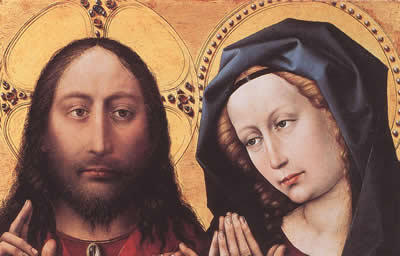
Prophet to the Nations
God’s words in today’s First Reading point us beyond Jeremiah to Jesus. Like Jeremiah, Jesus was consecrated in the womb and sent as a “prophet to the nations” (see Luke 1:31-33).
Like the prophets before Him, Jesus too faces hostility. In today’s Gospel, the crowd in His hometown synagogue quickly turns on Him, apparently demanding a sign, some proof of divine origins—that He’s more than just “the son of Joseph.”
The sign He gives them is that of the prophets Elijah and Elisha. From their colorful careers Jesus draws two stories. In each, the prophets bypass “many…in Israel” to bestow God’s blessings on non-Israelites who had faith that the prophets were men of God (see 1 Kings 17:1-16; 2 Kings 5:1-14). “None…not one” in Israel was found deserving, Jesus emphasizes.
His point isn’t lost on His audience. They know He’s likening them to the “many…in Israel” in the days of the prophets. That’s why they try to shove Him off the cliff. As He promised to protect Jeremiah, the Lord delivers Jesus from those who would crush Him.
And as were Elijah and Elisha, Jesus is sent to proclaim God’s gift of salvation—not exclusively to one nation or people, but to all who realize in faith that from the womb God alone is their hope, their rescuer, their “rock of refuge,” as we sing in today’s Psalm.
Prophecies, Paul tells us in today’s Epistle, are partial and pass away “when the perfect comes.” In Jesus, the word of the prophets has been brought to perfection, fulfilled in those who have ears to hear, as He declares in today’s Gospel.
Greater than the gifts of faith and hope, Jesus shows us how to love as He loved, to love God as our Father, as One Who formed us in the womb and destined us to hear His saving Word.
This is the salvation, the “mighty works of the Lord,” that we, as the Psalmist, are thankful to proclaim daily in the Eucharist.
St. Cyril of Alexandria
On the prophet Isaiah, 5, 5; (PG 70, 1352-1353)
Desiring to win over the whole world and bring its inhabitants to God the Father, raising all things to a higher condition and, in a sense, renewing the face of the earth, the Lord of the universe «took the form of a servant» (Phil 2,7) and brought the Good News to the poor. This, he said, was why he had been sent (Lk 4,18).
Now by the poor we may understand those who were then deprived of all spiritual blessings and who lived in the world without hope and without God, as Scripture says. They are those among the Gentiles who, enriched by faith in Christ, have gained the divine, the heavenly treasure, which is the saving proclamation of the gospel. Through this they have become sharers in the kingdom of heaven and companions of the saints. They have inherited blessings impossible to express or comprehend, for «eye has not seen», says Scripture, «nor ear heard, nor human heart conceived what God has prepared for those who love him» (1Cor 2,9)…
All that has been said, however, could also be applied to the Israelites, for they too were poor, brokenhearted, captives in a certain sense, and in darkness. But Christ came, and it was to the Israelites first that he made known the purpose of his coming: he came to proclaim the acceptable year of the Lord (Lk 4,19), and the day of retribution.
